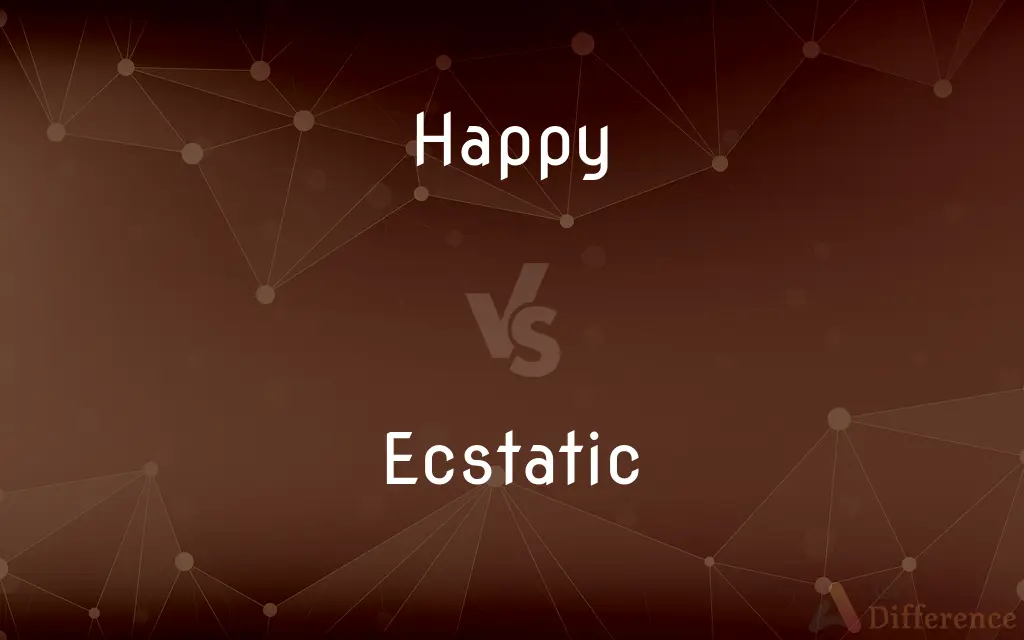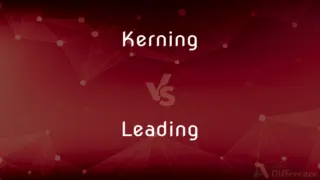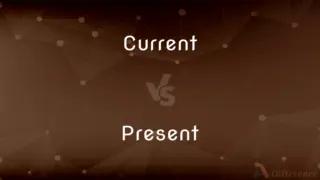Happy vs. Ecstatic — What's the Difference?
By Urooj Arif & Maham Liaqat — Updated on May 2, 2024
Happy refers to a general state of contentment and well-being, while ecstatic describes an intense, often overwhelming joy.

Difference Between Happy and Ecstatic
Table of Contents
ADVERTISEMENT
Key Differences
Happiness is a broad, enduring emotion that reflects a state of general satisfaction or positive well-being. In contrast, ecstasy denotes a peak emotional state, characterized by intense feelings of joy and exhilaration that can be brief and more profound.
Being happy is often associated with a variety of life situations, such as achieving personal goals, enjoying day-to-day activities, or maintaining good relationships. On the other hand, feeling ecstatic is usually tied to specific, extraordinary moments that provoke a heightened emotional response.
While happiness can be considered a stable and sustainable state of mind, contributing to overall life satisfaction, ecstatic experiences are typically transient, lasting only for a short duration but creating memorable and highly emotive peaks.
In daily language, describing oneself as happy does not necessarily imply any extreme of emotion, just a pleasant level of contentment. Conversely, describing oneself as ecstatic suggests a powerful surge of happiness, often in reaction to a particularly positive event or piece of news.
The causes of happiness can be diverse and multi-faceted, ranging from personal achievements and good health to stable social connections and a sense of purpose. Ecstatic joy, however, is often triggered by sudden, exceptionally good news or events, such as winning a major award, experiencing a significant personal breakthrough, or other life-altering occurrences.
ADVERTISEMENT
Comparison Chart
Intensity
Moderate, stable
Very high, peak moments
Duration
Long-lasting, enduring
Short-lived, transient
Common Causes
Achievements, relationships, peace
Major victories, life milestones
Emotional Range
Broad, balanced
Narrow, focused on joy
Life Impact
Contributes to overall life quality
Marks memorable life moments
Compare with Definitions
Happy
Can be mild or moderate in intensity.
She was happy to hear from an old friend.
Ecstatic
Feeling or expressing overwhelming happiness or joyful excitement.
She was ecstatic to find out she had won the lottery.
Happy
Feeling pleased or content with life.
She felt happy just relaxing at home with a good book.
Ecstatic
Often a response to extraordinary events.
He was ecstatic when his team won the championship.
Happy
A state reflecting general well-being.
He has been really happy since he started his new job.
Ecstatic
Characterized by a high degree of emotional intensity.
They were ecstatic at the birth of their granddaughter.
Happy
Sustainable and stable emotion.
Maintaining a happy disposition helps in overall health.
Ecstatic
Typically transient and momentary.
Her ecstatic feeling at the concert lasted all night.
Happy
Often related to good life circumstances.
They were happy to spend time with their family over the holidays.
Ecstatic
Exceeds the usual happiness.
They were ecstatic to receive unexpected good news.
Happy
Feeling or showing pleasure or contentment
They are happy to see me doing well
Melissa came in looking happy and excited
We're just happy that he's still alive
Ecstatic
Marked by or expressing ecstasy.
Happy
Fortunate and convenient
He had the happy knack of making people like him
Ecstatic
Being in a state of ecstasy; joyful or enraptured.
Happy
Inclined to use a specified thing excessively or at random
They tended to be grenade-happy
Ecstatic
Feeling or characterized by ecstasy.
Happy
Enjoying, showing, or marked by pleasure, satisfaction, or joy
A happy child.
The happiest day of my life.
Ecstatic
Extremely happy.
Happy
Cheerful; willing
Happy to help.
Ecstatic
Relating to, or caused by, ecstasy or excessive emotion.
Ecstatic gaze
Ecstatic trance
Happy
Characterized by good luck
A happy sequence of events.
Ecstatic
(in the plural) Transports of delight; words or actions performed in a state of ecstasy.
Happy
Being especially well-adapted; felicitous
A happy turn of phrase.
Ecstatic
A person in a state of ecstasy.
Happy
Characterized by a spontaneous or obsessive inclination to use something. Often used in combination
Trigger-happy.
Ecstatic
Pertaining to, or caused by, ecstasy or excessive emotion; of the nature, or in a state, of ecstasy; as, ecstatic gaze; ecstatic trance.
This ecstatic fit of love and jealousy.
Happy
Enthusiastic about or involved with to a disproportionate degree. Often used in combination
Money-happy.
Clothes-happy.
Ecstatic
Delightful beyond measure; rapturous; ravishing; as, ecstatic bliss or joy.
Happy
Having a feeling arising from a consciousness of well-being or of enjoyment; enjoying good of any kind, such as comfort, peace, or tranquillity; blissful, contented, joyous.
Music makes me feel happy.
Ecstatic
An enthusiast.
Happy
Experiencing the effect of favourable fortune; favored by fortune or luck; fortunate, lucky, propitious.
Ecstatic
Feeling great rapture or delight
Happy
Content, willing, satisfied (with or to do something); having no objection (to something).
Are you happy to pay me back by the end of the week?
Yes, I am happy with the decision.
Happy
(Of acts, speech, etc.) Appropriate, apt, felicitous.
A happy coincidence
Happy
(in combination) Favoring or inclined to use.
Slaphappy, trigger-happy
Happy
Dexterous, ready, skilful.
Happy
Implying 'May you have a happy ~' or similar; used in phrases to wish someone happiness or good fortune at the time of a festival, celebration, or other event or activity.
Happy birthday!, Happy Fourth of July!, Happy anniversary!, Happy job-hunting!
Happy
A happy event, thing, person, etc.
Happy
Often followed by up: to become happy; to brighten up, to cheer up.
Happy
Often followed by up: to make happy; to brighten, to cheer, to enliven.
Happy
Favored by hap, luck, or fortune; lucky; fortunate; successful; prosperous; satisfying desire; as, a happy expedient; a happy effort; a happy venture; a happy omen.
Chymists have been more happy in finding experiments than the causes of them.
Happy
Experiencing the effect of favorable fortune; having the feeling arising from the consciousness of well-being or of enjoyment; enjoying good of any kind, as peace, tranquillity, comfort; contented; joyous; as, happy hours, happy thoughts.
Happy is that people, whose God is the Lord.
The learned is happy Nature to explore,The fool is happy that he knows no more.
Happy
Dexterous; ready; apt; felicitous.
One gentleman is happy at a reply, another excels in a in a rejoinder.
Happy
Enjoying or showing or marked by joy or pleasure or good fortune;
A happy smile
Spent many happy days on the beach
A happy marriage
Happy
Experiencing pleasure or joy;
Happy you are here
Pleased with the good news
Happy
Marked by good fortune;
A felicitous life
A happy outcome
Happy
Satisfied; enjoying well-being and contentment;
Felt content with her lot
Quite happy to let things go on as they are
Happy
Exaggerated feeling of well-being or elation
Happy
Well expressed and to the point;
A happy turn of phrase
A few well-chosen words
A felicitous comment
Common Curiosities
What might trigger an ecstatic response?
An ecstatic response might be triggered by unusually great news, exceptional personal achievements, or other significant life events.
What is the main difference between being happy and being ecstatic?
Being happy is a more general and enduring state of contentment, while being ecstatic refers to intense, often brief moments of overwhelming joy.
Is it normal to experience both happy and ecstatic emotions?
Yes, it's normal and healthy to experience both stable happiness and peaks of ecstasy in response to different life circumstances.
Can an ecstatic moment affect someone's overall happiness?
Yes, experiencing moments of ecstasy can enhance a person's overall sense of happiness and life satisfaction.
Can a person feel ecstatic without being generally happy?
Yes, ecstatic moments can occur regardless of a person's general state of happiness and are typically tied to specific events.
How does the sustainability of happiness compare to the transient nature of ecstasy?
Happiness is generally a long-lasting emotion, contributing to overall life satisfaction, while ecstasy is usually fleeting, tied to specific joyous events.
How do children and adults differ in their expressions of happiness and ecstasy?
Children often express both happiness and ecstasy more openly and frequently than adults, who might have more restrained expressions due to social conventions.
Does long-term happiness impact health?
Long-term happiness is associated with numerous health benefits, including lower stress levels and a longer lifespan.
What activities are commonly associated with inducing happiness and ecstasy?
Happiness can be induced by a variety of everyday activities, while ecstatic moments are usually linked to significant achievements or unexpected positive surprises.
How do societal norms influence expressions of happiness and ecstasy?
Societal norms can influence how openly happiness and ecstasy are expressed, with some cultures encouraging exuberant displays while others might favor more subdued expressions.
Is ecstasy more commonly associated with particular life stages or events?
Ecstasy is often associated with life milestones such as weddings, major achievements, or unexpected wins, and can be experienced at any life stage.
What role does personal disposition play in feeling happy or ecstatic?
Personal disposition, including one's outlook and temperament, can greatly influence how often and intensely one feels happy or ecstatic.
How do people express ecstatic joy?
Ecstatic joy is often expressed through exuberant behavior, such as cheering, laughter, and even tears of joy.
Are there any downsides to ecstatic emotions?
While generally positive, extremely ecstatic emotions can be overwhelming and, if due to sudden changes, might lead to emotional instability if not balanced with other stable emotions.
Can the intensity of happiness reach the level of ecstasy?
In some cases, particularly joyful or fulfilling moments can elevate happiness to an ecstatic level, though typically ecstasy is marked by its suddenness and intensity.
Share Your Discovery

Previous Comparison
Kerning vs. Leading
Next Comparison
Current vs. PresentAuthor Spotlight
Written by
Urooj ArifUrooj is a skilled content writer at Ask Difference, known for her exceptional ability to simplify complex topics into engaging and informative content. With a passion for research and a flair for clear, concise writing, she consistently delivers articles that resonate with our diverse audience.
Co-written by
Maham Liaqat















































